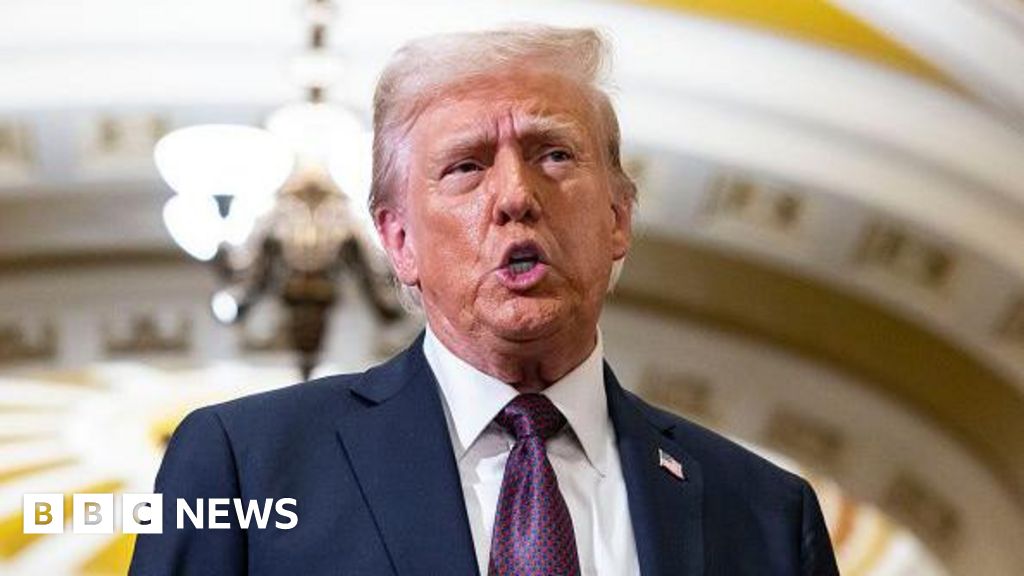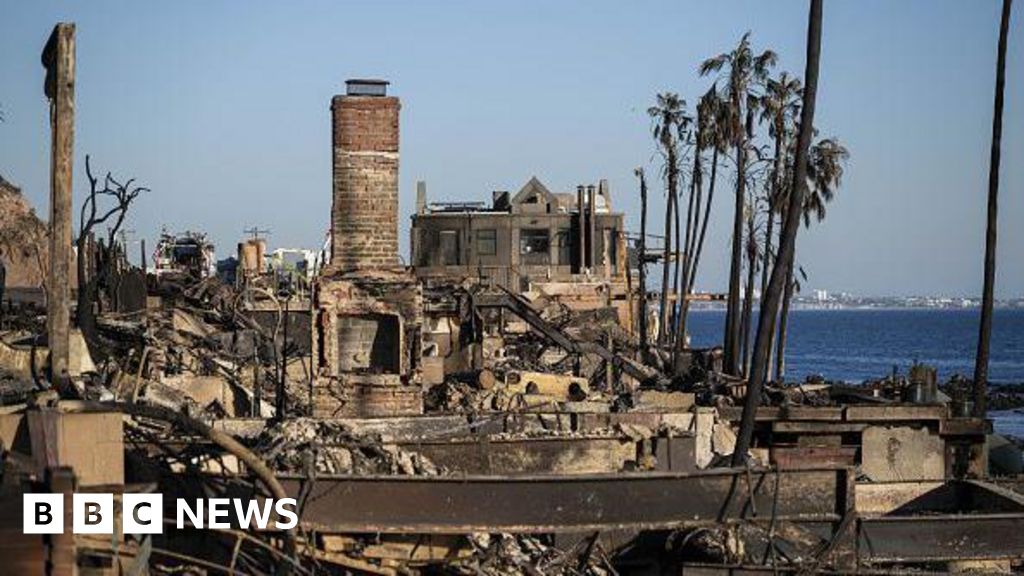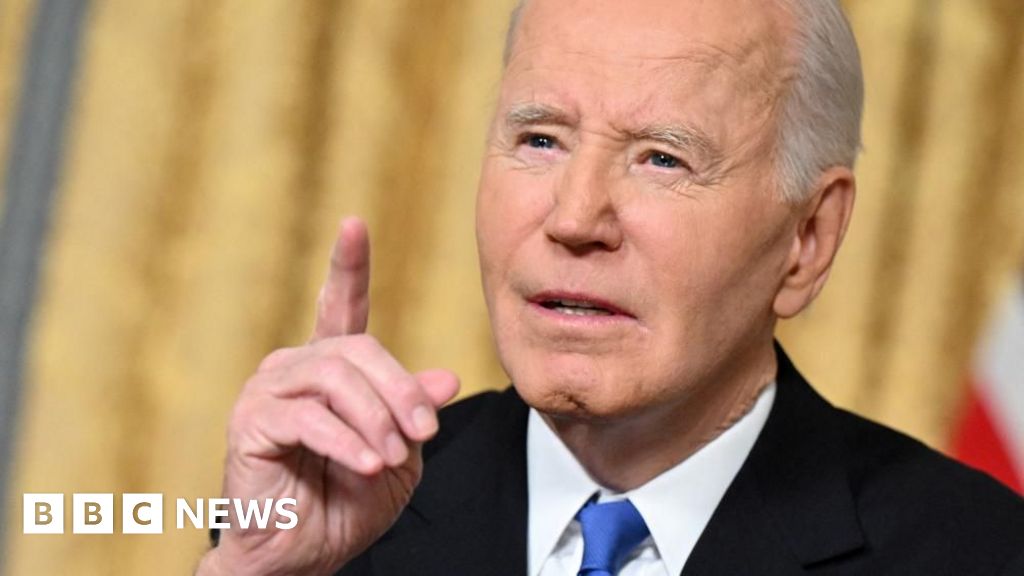ARTICLE AD BOX
By Sam Cabral
BBC News, Washington
Image source, Getty Images
Image caption, Kyle Rittenhouse is charged with fatally shooting protesters in Wisconsin last yearLast year, a US teen shot three people during unrest on the streets of Wisconsin. Attorneys at his murder trial will argue he acted in self-defence.
Kyle Rittenhouse, 18, is charged with killing two men and wounding another during civil unrest in the streets of Kenosha last August.
As his trial began on Tuesday, prosecutors argued the Illinois native came looking for trouble that night.
Mr Rittenhouse has pleaded not guilty and his lawyers say he feared for his life.
Here's what we know about the case so far.
What are the facts of the case?
On 25 August 2020, 17-year-old Kyle Rittenhouse travelled from his home in Antioch, Illinois to Kenosha, in neighbouring Wisconsin, with an AR-style semiautomatic rifle in tow.
The teen was responding to a call on social media for armed Americans to help protect property from unrest on the streets.
Local officials had declared a state of emergency two days earlier amid mass protests and street unrest over the shooting of Jacob Blake, a black man. The incident came just three months after a national outcry over the police murder of George Floyd, an unarmed black man, in Minneapolis.
Bystander video captures Mr Rittenhouse being chased into the car park of a used car dealership by Joseph Rosenbaum, 36.
Moments later, unseen on video, Mr Rittenhouse fires four times and kills Rosenbaum.
As he runs down the street away from the scene, Mr Rittenhouse falls and multiple people converge upon him.
Anthony Huber, 26, hits him in the head and neck with a skateboard. Mr Rittenhouse kills him with a bullet to the stomach.
Gaige Grosskreutz, 27, approaches him with a pistol in hand. Mr Rittenhouse wounds him with a shot in the arm.
He is now facing six counts, including reckless homicide, intentional homicide and recklessly endangering safety.
If convicted of the most serious charges, he could spend decades in prison.
The prosecution and defence made their opening arguments in court on Tuesday.
What is Rittenhouse's defence?
Attorneys for Mr Rittenhouse claim he came to Kenosha to protect businesses from looters and rioters, not to harm anyone.
Arguing he had no choice but to shoot at the men he engaged with, they will try to show that each individual attacked Mr Rittenhouse or tried to grab his gun.
The defence is also likely to present evidence that Mr Rittenhouse was carrying a first aid kit and had friendly interactions with police that led him to believe he was doing the right thing.
In the aftermath of the shooting, Kenosha police were captured on video tossing bottles of water to Mr Rittenhouse and other armed civilians.
"We appreciate you guys, we really do," one grateful officer is heard saying.
Mr Rittenhouse's defenders say he was exercising his right to bear arms, in defence of liberty.
Both Mr Rittenhouse's $2m (£1.5m) bail and his legal defence fund were covered by fundraising online.
In a video released by Mr Rittenhouse's legal team last year, a voice declared he was "being sacrificed by politicians. Their end game is to strip away the constitutional right of all citizens to defend our communities".
What do prosecutors need to prove?
Kenosha County Assistant District Attorney Thomas Binger and his team of prosecutors will need to persuade the jury that Mr Rittenhouse was not acting in self-defence.
They will argue he was a "teenage vigilante" who came to Kenosha "with the intent to violently clash with those opposed to his beliefs".
The attorneys will question why Mr Rittenhouse travelled across state lines and why he was outdoors long after an 8pm curfew imposed by city officials.
Wisconsin state law prohibits those under 18 from being armed, unless they are hunting, so there will likely be scrutiny of how and why the weapon was obtained.
Mr Rittenhouse's support for law enforcement and his affinity with firearms are well-documented on social media, and could be presented as evidence in court.
Prosecutors will also seek to prove the men who intercepted him were simply trying to stop him.
But convincing the 20-person jury to convict Mr Rittenhouse will be an uphill climb, says John Gross, a criminal defence expert at the University of Wisconsin-Madison.
"Once the evidence suggests that the defendant may have acted in self-defence, the burden shifts to the prosecution, and the prosecution has to disprove beyond a reasonable doubt that the defendant acted in self-defence," he explains.
"It was late at night, the scene was very chaotic and there were a lot of people carrying weapons, so it remains to be seen how strong a case the prosecution will be able to make," he says.
But, he adds, "the law generally does not recognise your right to use deadly force to defend property, only your person".
How is self-defence justified in the US?
In the US, people can justify their use of deadly force against another when it reasonably appears necessary.
Wisconsinites may not be prosecuted if their methods of self-defence were "necessary to prevent imminent death or great bodily harm". The legal standard comes with a two-part test.
Jurors must decide whether or not the use of deadly force was objectively reasonable under the circumstances.
Image source, Getty Images
Image caption, Violence marred the streets of Kenosha in the wake of Jacob Blake's shooting"Did the person reasonably fear that they were about to be assaulted and seriously injured? If they did, then they would be entitled to use self-defence," says Mr Gross.
Then, the 20-person jury must also "put themselves in the shoes of the defendant" to decide if, knowing what he knew then, Mr Rittenhouse sincerely believed he was in danger.
"In the moment the defendant used deadly force, if his belief was reasonable but mistaken, it's still considered reasonable under the circumstances," he notes.
Mr Gross tells the BBC that the dual test will need to be applied three times over - unlike in other self-defence cases - because Mr Rittenhouse shot three people.
He also points out the challenge ahead for jurors as the highly politicised case unfolds.
"People either see [Mr Rittenhouse] as a hero or a villain," says Mr Gross. "It's going to be challenging for jurors to focus on the specifics of the case and strip away a lot of the baggage that has been attached to him."

 3 years ago
67
3 years ago
67








 English (US) ·
English (US) ·